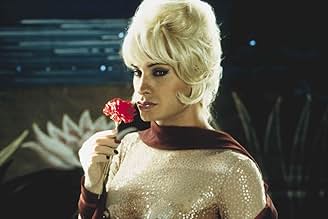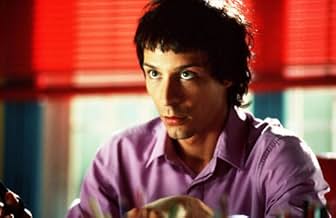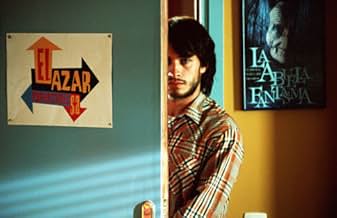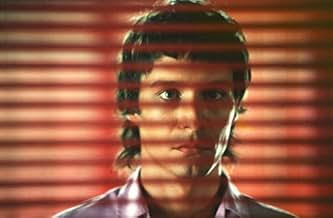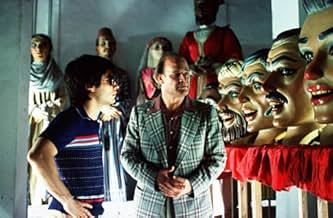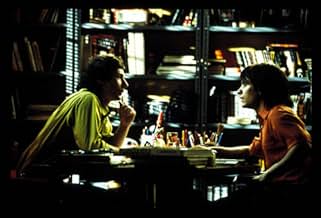CALIFICACIÓN DE IMDb
7.4/10
65 k
TU CALIFICACIÓN
Una mirada a los efectos que tuvieron las escuelas religiosas franquistas y sus abusos sexuales a través de los ojos de dos amigos de infancia.Una mirada a los efectos que tuvieron las escuelas religiosas franquistas y sus abusos sexuales a través de los ojos de dos amigos de infancia.Una mirada a los efectos que tuvieron las escuelas religiosas franquistas y sus abusos sexuales a través de los ojos de dos amigos de infancia.
- Nominada a1 premio BAFTA
- 16 premios ganados y 42 nominaciones en total
Nacho Pérez
- Ignacio
- (as Ignacio Pérez)
Raúl García Forneiro
- Enrique
- (as Raúl Gª Forneiro)
Agustín Almodóvar
- Limpiador Piscina
- (sin créditos)
Pedro Almodóvar
- Limpiador Piscina
- (sin créditos)
Robert Forcadell
- Man in public
- (sin créditos)
Luis Lobos Negros
- Motero ochentero
- (sin créditos)
- Dirección
- Guionista
- Todo el elenco y el equipo
- Producción, taquilla y más en IMDbPro
Opiniones destacadas
The latest film by Almodovar after the awarded All about my mother and Talk to her has divided the public opinion. Part of the audience say its the continuity of the director's talent and the other part does not like the film at all. But this division has always happened with Almodovar films, you love it or you hate it.
Of course the subject of the church and the pederasty has provoked scandals, like the cancellation of the film in many French cinemas, but despite this fact the film has been the one chosen (and the first Spanish film) to open the Cannes festival.
In the film we can feel Almodovar touch everywhere: the tremendously deep characters, the unbelievable plot and the colourful scene as well as in the camera angles. All this things make Almodovar maintain a fidelity to his style. Another curiosity is the cameo that the director's brother, who appears in most of his films, does, in this case as a pool cleaner.
The Gael Garcia's acting, without Mexican accent, is wonderful and he shines as a travestite femme fatale, an icon to noir films, just as Almodovar likes to describe the film.. The atmosphere of the film carries us to the 80s thanks to its perfect job of decoration and wardrobe documentation .
Of course the subject of the church and the pederasty has provoked scandals, like the cancellation of the film in many French cinemas, but despite this fact the film has been the one chosen (and the first Spanish film) to open the Cannes festival.
In the film we can feel Almodovar touch everywhere: the tremendously deep characters, the unbelievable plot and the colourful scene as well as in the camera angles. All this things make Almodovar maintain a fidelity to his style. Another curiosity is the cameo that the director's brother, who appears in most of his films, does, in this case as a pool cleaner.
The Gael Garcia's acting, without Mexican accent, is wonderful and he shines as a travestite femme fatale, an icon to noir films, just as Almodovar likes to describe the film.. The atmosphere of the film carries us to the 80s thanks to its perfect job of decoration and wardrobe documentation .
With 'La Mala Educación' Pedro Almodóvar has surpassed himself. It's a very intelligent film with wisely-chosen actors. Gael García Bernal is simply magnificent in portraying three very different characters. This goes to show that he's not only got looks but also a great talent. It couldn't have been easy for him, especially when doing the role of Zahara! Fele Martínez is also very good as Enrique, Ignacio's beloved childhood friend. A round of applause goes to the young Ignacio as well. One can see the anxiety in his eyes when Father Manolo approaches him. The latter's frustration is very clearly brought out in the direction of certain scenes by Almodóvar. Definitely not a film to miss!
Is it an accusation of the Catholic Church or is it the story of a priest who is bound by his religion to strict rules concerning sex and feelings? Is there a theme in the film or is it just a story? Those are a couple of questions I asked myself after seeing La Mala Educación from the Spanish director Pedro Almodóvar.
Actually, La Mala Educación exists of three stories which have been interwoven in a miraculous way. Story one: film director Enrique is being paid a visit by a long lost friend. That friend, Ignacio, is an actor and has written a story that Enrique might want to make into a film. Enrique's story is for one part made up by Ignacio's and Enrique's experiences when they were young boys and were living in a Catholic boarding school. Ignacio reads the manuscript and sees the pictures in his head, and that is story two: a transvestite finds an old friend, Ignacio. After having sex, the transvestite steals a manuscript Ignacio wrote about his secret: while in boarding school he was sexually abused by a priest. To gain money, the transvestite blackmails the priest: give me money or I'll publish the manuscript. The priest reads parts of the manuscript. And that is the third story: the experiences of the real Enrique and the real Ignacio while attending boarding school. During that time they discovered the meaning of friendship, love and physical desires.
You have to keep up with the film. When your attention wanes you might miss a detail that's important later. When seeing the film, try to remember the names of the characters very quickly. It makes viewing easier.
Is La Mala Educación a typical Pedro Almodóvar film? Yes and no. No, since women are not the main theme, as in his other films. No, because it's not an unbelievable and absurdist story. Yes, since the film has some typical Almodóvar characteristics: the transvestite, the junkie that is caught on the lee shore, and the hope people have to reach a better life. More than in other Almodóvar films homosexuality is an important theme.
When the film was over you could see the visitors of the cinema thinking: is it a film about the Catholic Church, about emotions and selfishness, about The scenes had to fall in place.
Actually, La Mala Educación exists of three stories which have been interwoven in a miraculous way. Story one: film director Enrique is being paid a visit by a long lost friend. That friend, Ignacio, is an actor and has written a story that Enrique might want to make into a film. Enrique's story is for one part made up by Ignacio's and Enrique's experiences when they were young boys and were living in a Catholic boarding school. Ignacio reads the manuscript and sees the pictures in his head, and that is story two: a transvestite finds an old friend, Ignacio. After having sex, the transvestite steals a manuscript Ignacio wrote about his secret: while in boarding school he was sexually abused by a priest. To gain money, the transvestite blackmails the priest: give me money or I'll publish the manuscript. The priest reads parts of the manuscript. And that is the third story: the experiences of the real Enrique and the real Ignacio while attending boarding school. During that time they discovered the meaning of friendship, love and physical desires.
You have to keep up with the film. When your attention wanes you might miss a detail that's important later. When seeing the film, try to remember the names of the characters very quickly. It makes viewing easier.
Is La Mala Educación a typical Pedro Almodóvar film? Yes and no. No, since women are not the main theme, as in his other films. No, because it's not an unbelievable and absurdist story. Yes, since the film has some typical Almodóvar characteristics: the transvestite, the junkie that is caught on the lee shore, and the hope people have to reach a better life. More than in other Almodóvar films homosexuality is an important theme.
When the film was over you could see the visitors of the cinema thinking: is it a film about the Catholic Church, about emotions and selfishness, about The scenes had to fall in place.
Spoilers
Since 'Hable con ella' ('Talk to her', for which my summary line was 'Almodovar mellowing?') which some consider Almodovar's best, his fans have been looking forward to his next one with great expectation but also some apprehension as to how could he possibly tope it, in the sheer ingenious creativity, if nothing else. Bound for Cannes release, Bad Education soon demonstrated that the apprehension is not unfounded. It is, after all, not easy to surpass the achievement of Hanle con ella. Undoubtedly still Almodovar, Bad Education however is Almodovar melodrama, a little short of Almodovar masterpiece.
The film opens with attention grabbing, definitive music (regardless of what mood) that is Almodovar's hallmark. Similarly, we see the inimitable Almodovar feuding colours. Homosexuality and fetishism you'll almost always expect in an Almodovar film but there is less extreme perversity and violence compared with some of his other pictures.
And here comes the plot. The story of the young altar boys is told in a manuscript of a book entitled 'The Visit', which is used by one of the grown-up boys Ignacio, now a transvestite called Zahara, as a tool for blackmailing Father Manolo. But wait, all this is just in a screenplay. The story of Father Manolo and the altar boys however is real. The real Ignacio is the screenplay writer, who is trying to get Enrique the film director, another grown-up altar boy, to produce the film. But wait again, Ignacio doesn't want to be called Ignacio, claiming that he is now a fully transformed person called Angel, an actor trying very hard to get to play the part Zahara. Having fun yet? There's more. Enrique becomes suspicious if Ignacio/Angel is really the Ignacio he knew as a kid, and embarks on an investigation. Meanwhile, Father Monolo jumps out of the screenplay, materialising as a real person. And all these stories within stories are told jumping back and forth between past and present, fiction and reality. Enough? There's more, a lot more.
In the end, Bad Education, while enormously entertaining, stops at being just that instead of moving further into the realm of depth of emotion and breadth of creativity we see in Talk to Her and All About Mother. However, in addition to the entertainment, there is one particularly bright spot, one Gael Garcia Bernal (playing Angel and all the rest of them) who first served notice in the brilliant Mexican film Amores perros (2000) that he has to be reckoned with. I just can't wait to see him play Cuban revolutionary icon 'Che' Geuvara in Motorcycle Diaries (2004).
Since 'Hable con ella' ('Talk to her', for which my summary line was 'Almodovar mellowing?') which some consider Almodovar's best, his fans have been looking forward to his next one with great expectation but also some apprehension as to how could he possibly tope it, in the sheer ingenious creativity, if nothing else. Bound for Cannes release, Bad Education soon demonstrated that the apprehension is not unfounded. It is, after all, not easy to surpass the achievement of Hanle con ella. Undoubtedly still Almodovar, Bad Education however is Almodovar melodrama, a little short of Almodovar masterpiece.
The film opens with attention grabbing, definitive music (regardless of what mood) that is Almodovar's hallmark. Similarly, we see the inimitable Almodovar feuding colours. Homosexuality and fetishism you'll almost always expect in an Almodovar film but there is less extreme perversity and violence compared with some of his other pictures.
And here comes the plot. The story of the young altar boys is told in a manuscript of a book entitled 'The Visit', which is used by one of the grown-up boys Ignacio, now a transvestite called Zahara, as a tool for blackmailing Father Manolo. But wait, all this is just in a screenplay. The story of Father Manolo and the altar boys however is real. The real Ignacio is the screenplay writer, who is trying to get Enrique the film director, another grown-up altar boy, to produce the film. But wait again, Ignacio doesn't want to be called Ignacio, claiming that he is now a fully transformed person called Angel, an actor trying very hard to get to play the part Zahara. Having fun yet? There's more. Enrique becomes suspicious if Ignacio/Angel is really the Ignacio he knew as a kid, and embarks on an investigation. Meanwhile, Father Monolo jumps out of the screenplay, materialising as a real person. And all these stories within stories are told jumping back and forth between past and present, fiction and reality. Enough? There's more, a lot more.
In the end, Bad Education, while enormously entertaining, stops at being just that instead of moving further into the realm of depth of emotion and breadth of creativity we see in Talk to Her and All About Mother. However, in addition to the entertainment, there is one particularly bright spot, one Gael Garcia Bernal (playing Angel and all the rest of them) who first served notice in the brilliant Mexican film Amores perros (2000) that he has to be reckoned with. I just can't wait to see him play Cuban revolutionary icon 'Che' Geuvara in Motorcycle Diaries (2004).
Almodovar's latest film is a tantalizing, hypnotic and sexy mixture of VERTIGO, MEMENTO and MULLHOLLAND DRIVE. It's Almodovar's meatiest and most complex script in years. Although you may be confused early on as you're trying to figure out whats going on, its all revealed later and very satisfyingly. Gael Garcia Bernal is outstanding in his multi-dimensional, multi-character performance. Alberto Iglesia's music is wonderful--a homage to Bernard Herrmann.
The film is rated NC-17, which has more to do with the MPAA Board's homophobia than anything else. Sure, its a sexy drama with elements adult plotpoints, but had the sex scenes in this film been between a man and a woman, rather than two men, this would have easily gotten an R rating. All of the sex scenes are artfully filmed (there is no frontal nudity) and even the subplot concerning a pedophile priest is handled with care.
The film is rated NC-17, which has more to do with the MPAA Board's homophobia than anything else. Sure, its a sexy drama with elements adult plotpoints, but had the sex scenes in this film been between a man and a woman, rather than two men, this would have easily gotten an R rating. All of the sex scenes are artfully filmed (there is no frontal nudity) and even the subplot concerning a pedophile priest is handled with care.
¿Sabías que…?
- TriviaGael García Bernal fired off an angry riposte to New York Times reporter Lynn Hirschberg after she claimed that he had fallen out with Pedro Almodóvar over filming the explicit homosexual love scenes in the film. Bernal wanted it on record that he had had absolutely no reservations about taking the role.
- ErroresWhen Burenguer declines Ignacio's story over the phone, he says that he wouldn't be accepting it for "Short Stories of the 80's." According to his story, it would have had to been at least 1977, three years before the 1980s, let alone before a compilation of stories from the 1980s would be released.
- Versiones alternativasAn R-rated version of the film that trims or cuts some scenes was released on DVD, though the original NC-17 one is also available in the exact same format.
- Bandas sonorasQuizás, Quizás, Quizás
Written by Osvaldo Farrés
Published by Peer International Corporation (BMI)
(c) 1947 by Caribbean Music Co. Ltd
Performed by Sara Montiel
By the license from Dpto. de Productos Especiales de (p) EMI Odeon, S.A., Madrid, España, 2003
Selecciones populares
Inicia sesión para calificar y agrega a la lista de videos para obtener recomendaciones personalizadas
- How long is Bad Education?Con tecnología de Alexa
Detalles
- Fecha de lanzamiento
- Países de origen
- Sitio oficial
- Idiomas
- También se conoce como
- Bad Education
- Locaciones de filmación
- Productoras
- Ver más créditos de la compañía en IMDbPro
Taquilla
- Presupuesto
- USD 5,000,000 (estimado)
- Total en EE. UU. y Canadá
- USD 5,284,284
- Fin de semana de estreno en EE. UU. y Canadá
- USD 147,370
- 21 nov 2004
- Total a nivel mundial
- USD 40,432,275
- Tiempo de ejecución
- 1h 46min(106 min)
- Mezcla de sonido
- Relación de aspecto
- 2.35 : 1
Contribuir a esta página
Sugiere una edición o agrega el contenido que falta

